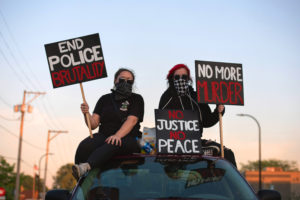More than 20 years before the advent of Tinder, an MTV show called Singled Out offered an unwittingly prescient insight into the dangers of algorithmic dating. The premise was simple: a dating pool of 50 potential suitors milled around in a sort of human holding pen, while an eligible bachelor (or bachelorette) sat behind a velvet curtain that blocked the candidates from view. The featured contestant would then make a series of binary choices — older or younger? tall or short? commitment or nah? — narrowing the dating pool by process of elimination.
This is where things got hairy: with each selection, the rejected partners would exit past the person doing the picking, who would see their faces for the first time. The point was torment, obviously: behold the sea of beautiful people you just canned for totally arbitrary reasons. The potential for regret in this moment was so powerful that the show eventually introduced a new gimmick, whereby the featured contestant had one “golden lifesaver” that could be used to save a passing reject.
In the era of dating apps, users are of course spared the anguish of a physical confrontation with all the people they’ve categorically rejected; the algorithm is the man behind the curtain, mercilessly dismissing everyone who doesn’t fit your preferences, out of sight, out of mind. We tell ourselves it is more efficient this way, ordering a human being via the same box-checking exercise we use to build a burrito bowl at Chipotle. We tell ourselves, more importantly, that not doing this is a risky proposition, maybe even a dangerous one. Without the algorithm, who knows what you might end up with? He could be short. Or a Nickelback fan. Or, gulp, a Republican.
Everything’s Fine, a new novel by Cecilia Rabess, seems like a cautionary tale about the dangers of too-indiscriminate, non-algorithmic dating. The relationship in this story is between two people who would never have matched on Tinder: Jess, a progressive and professionally ambitious black woman who works as a Wall Street trader, and Josh, a pragmatic fellow trader who describes himself as a moderate, but who Jess insists (sometimes to his face) is the personification of conservative cishet white male privilege. As a complicating factor, clues littered throughout the book suggest Josh might actually be Jewish — or rather, this would complicate things, if Jess had an iota of curiosity about it, but she doesn’t. Her obliviousness seems to be shared by Rabess herself: the only definitely Jewish character in this book, the main antagonist, happens to be a grasping, greedy, tax-dodging hedge fund manager.
Where other people see humans, Jess sees stereotypes. She is obsessed with voting habits as a proxy for character. If she had a dating app profile, she would emblazon it with one of those “Republicans swipe left” warnings. In this, of course, she would only be doing what the media has lately identified as the sole sensible strategy for selecting a romantic partner: in our obsession with “red flags”, political beliefs have become the ultimate dating dealbreaker. Everything’s Fine has already been cancelled on Goodreads by people arguing that a progressive black character dating a conservative white one is a way to “excuse racists”.
A recent piece in the Atlantic reads out the writing on the wall, straightforwardly advising that politically heterogamous partnerships are a bad idea — “because research suggests that marriages across political or religious lines (when those things matter significantly to each partner) can be less happy, more conflicted, and more likely to end in divorce than marriages where spouses agree on religion and politics”. Note that the caveat appears only parenthetically, as if the eventuality that these things might not matter significantly to each partner is barely worth mentioning.
Indeed, to believe that politics is a mere drop in the bucket of multitudes that each human being contains is not only outré in elite circles, but often cited, contemptuously, as evidence in and of itself of a certain political affiliation. Jill Filipovic, in an essay responding to the Atlantic article, writes:
“There’s an impulse, especially among those on the moderate right, to talk about politics as simply a set of preferences, like what kind of shows you might select on Netflix. But politics, especially in the post-Trump era … reflect entirely different goals and certainly different values, as well as very different ideas about what our country and our world should be, and — perhaps most crucially for a marriage — very different ideas about the rights, rules, and opportunities for women, men, and children.”
It’s a bit of a Kafka trap: push back against the defining importance of politics, and ugh, that’s just what a Right-winger would say. Among progressives, it is increasingly an article of faith that the personal is, and always will be, political; if you don’t think so, well, you’re not one of us.
I suspect, though, that this extremism is less Trump’s fault than Tinder’s. Algorithmic dating is all about finding reasons to write off entire categories of people as undateable — and to be savage about it. If a certain type of human being doesn’t spark joy, then into the bin they go. For women, particularly, to be as discriminating as possible in one’s romantic life is positioned as an act of self-care: you are holding out for what you deserve, and what you deserve is a person who checks every box, meets every criteria. To give an unqualified man a chance represents a failure to respect yourself.
And yet, I’m not sure that intentionally ensconcing oneself in a silo of perfect-on-paper people — and, by extension, seeing the values of everyone who thinks differently as an existential threat — is the best thing for any of us. Filipovic’s essay unwittingly demonstrates the hazards of entrenching oneself in this mindset: how intolerance gives rise to caricature, how stereotypes creep in to fill the empty spaces left by ignorance. Conservative men, in this view, are not just unsuitable partners but actual monsters: “With the demise of Roe v. Wade,” she writes, “a vote for a Republican politician is a vote to criminalise abortion, which is a vote to force women to risk their lives in pregnancy … If a man is willing to vote for that, why would you trust him with your body and your medical decisions? … Is he the man you want making medical decisions for your daughter, or teaching your son what masculinity looks like?
As visions of romance go, this one is absurdly catastrophic, not to mention dehumanising to everyone involved — the conservative men, obviously, but also the women who are depicted as brainwashed traitors to the sisterhood for even considering marrying one. (What of the fact that many of the most fervently pro-life voters are, themselves, women?) Its proponents might want to imagine how they’d feel if the tables were turned — if liberal women were being similarly caricatured and dismissed as amoral, unmarriageable ogres based on their voting patterns alone. In fact, this has happened within living memory: in 1992, the recently-deceased Pat Robertson decreed that feminism was “a socialist, anti-family political movement that encourages women to leave their husbands, kill their children, practice witchcraft, destroy capitalism and become lesbians”. This was news to the happily married non-witchcraft-practising feminists of the world, who rightly roasted Robertson for his ridiculous pronouncement. Had the man ever even met a feminist?
At the risk of stating the obvious, even couples who vote the same way still have differences, political or otherwise; they still disagree, fight, and get divorced. The Atlantic article frets that “fewer than half (47%) of politically mixed married couples report they are ‘completely satisfied with their family life,’ compared with ‘61% of couples in which both spouses are Republicans and 55% where both are Democrats’.” That’s one way to put it; the other way, of course, would be to note that your chances of marital satisfaction are roughly 50/50 whether you pair off within your own political tribe or not, making it a pretty impractical criterion for deciding who to marry.
Of course, this is the type of pragmatic take that Josh is always offering in Everything’s Fine, which inevitably infuriates Jess. “It’s just a hat,” he says, when she discovers a red MAGA baseball cap, a gag gift from a fishing trip, stuffed in a storage bin in the home they share. “It can’t hurt you.”
“But it’s not just a hat,” the book sombrely intones. “It makes Jess think of racism and hatred and systemic inequality, and the Ku Klux Klan, and plantation wedding Pinterest boards, and lynchings … and decades of propaganda and Fox News and conservative radio, and rabid evangelicals, and rape and pillage and plunder and plutocracy and money in politics and the dumbing down of civil discourse and domestic terrorism and white nationalists and school shootings—”
That paragraph continues for practically a full page — there is apparently no malady in the world for which the hat is not an avatar — but you get the idea. It’s all about going to extremes: your Republican vote is literally killing women, your feminist book club is full of lesbian witches, your little red hat might as well be a KKK hood. Josh, of course, is the bad guy for thinking that none of this makes any sense: he’s the oblivious toxic white male who not only brought the hat into the house, but is so blinded by his own privilege that he cannot sense its evil.
Because this is how Jess sees Josh, she treats him terribly, not that she treats herself much better. Her perpetual sense of victimhood, her certainty that she is at a permanent disadvantage owing to her race and sex and middle-class background, leads her to both take advantage of others and to sabotage herself. And while the book ends on an ambiguous note, her relationship with Josh is almost certainly doomed — not because she’s black and he’s white, or because she’s a liberal and he’s a conservative, but because he views her as a person while she views him as a collection of labels. Jess sometimes says she loves Josh, but she doesn’t. She doesn’t even see him.
That inability to look past someone’s labels has always been with us, embodied by the concept of the dating dealbreaker. Sometimes it’s political (“I could never be with someone who votes Republican”), sometimes it’s practical (“I could never be with someone who hates dogs”), sometimes it’s utterly arbitrary (“I could never love a man who wears pants tighter than I do.”) But really, we have no idea who we could or couldn’t love. For all our attempts to plan and predict and control our romantic destinies, human beings have never been good at knowing what — or who — will make them happy. And god, isn’t that terrifying?
In a world where love makes fools of us all, red flags, political or otherwise, operate as a sort of fantasy: a story you tell yourself about what kind of person you are, or perhaps what kind of person you’d like to be, dressed up as a declaration about what kind of person you could never be with. The dealbreaker is a way of imposing order: I know where the line is. I’m in charge. These stories can be comforting. They can be exciting. But that doesn’t make them true.
Disclaimer
Some of the posts we share are controversial and we do not necessarily agree with them in the whole extend. Sometimes we agree with the content or part of it but we do not agree with the narration or language. Nevertheless we find them somehow interesting, valuable and/or informative or we share them, because we strongly believe in freedom of speech, free press and journalism. We strongly encourage you to have a critical approach to all the content, do your own research and analysis to build your own opinion.
We would be glad to have your feedback.
Source: UnHerd Read the original article here: https://unherd.com/






